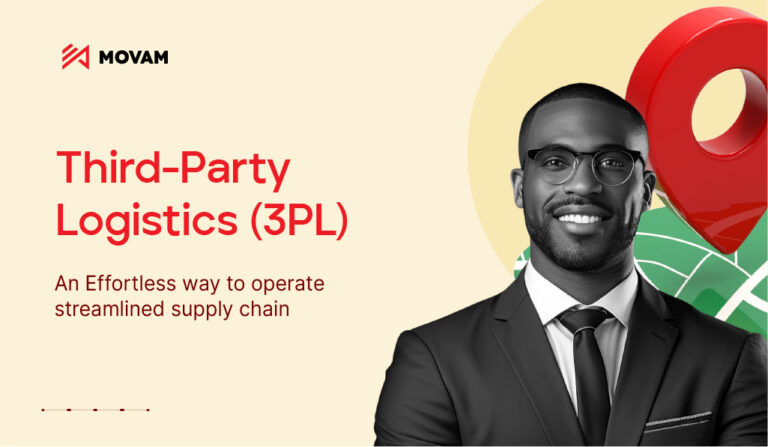Despite efforts to improve, Nigeria remains at the lower end of the Logistics Performance Index (LPI), particularly in ensuring that shipments reach their destinations within the expected delivery time. For businesses operating within the country, leveraging third-party logistics (3PL) providers could be a strategic solution to streamline supply chain operations and enhance delivery efficiency.
In this article, we will explore the key reasons why partnering with 3PL providers can lead to faster and more reliable results.
What is third party logistics?
Third-party logistics (3PL) refers to the process by which a company, typically the owner of goods, outsources various components of its supply chain operations to an external service provider known as a 3PL company. This partnership allows the client company to delegate tasks such as warehousing, inventory management, order fulfillment, transportation, and distribution to the 3PL provider. The 3PL company, leveraging its expertise and resources, manages these functions on behalf of the client, ensuring efficient and effective movement of goods from the point of origin to the final destination.
Why do shippers need 3pls
1. Reduction in Capital Investment
One of the primary ways 3PL providers save businesses money is by eliminating the need for significant capital investment in logistics infrastructure. Establishing and maintaining warehouses, distribution centers, and a transportation fleet requires substantial upfront costs and ongoing expenses. By outsourcing these functions to a 3PL, businesses can avoid these costs altogether.

According to a publication by the Outsourcing Institute, companies that outsource experience an average of 9% cost savings while also benefiting from a 15% increase in capacity and quality. This highlights the dual advantage of outsourcing: not only does it reduce operational expenses, but it also enhances overall performance by enabling companies to handle more work at a higher standard.
Furthermore, according to a report by Capgemini, 11% of shippers identified cost reduction as a primary benefit of using 3PL services.
Now, let’s consider a mid-sized e-commerce business looking to expand its operations. Setting up a warehouse in a new region might require an investment of several million dollars. However, by partnering with a 3PL that already has a warehouse network in place, the company can avoid these costs and instead pay a variable fee based on usage.
2. Economies of Scale
3PL providers serve multiple clients across various industries, allowing them to achieve economies of scale that individual companies cannot. This results in lower per-unit costs for warehousing, transportation, and other logistics services. By leveraging these economies of scale, 3PLs can offer their clients more competitive pricing than if they were to manage logistics in-house.
A report released at the Council of Supply Chain Management Professionals (CSCMP) conference shows 80% shippers agree that 3PLs contribute to reducing overall logistics costs.
A large retail chain may require daily shipments to hundreds of stores across the country. If the retailer manages transportation internally, they would need to negotiate shipping rates with carriers. However, a 3PL managing shipments for multiple clients can negotiate better rates due to higher overall shipping volumes, passing the savings on to the retailer.
3. Improved Efficiency and Technology Integration
Third-party logistics (3PL) providers are making substantial investments in technology to enhance and optimize their logistics operations. These include systems like Warehouse Management Systems (WMS) and Transportation Management Systems (TMS), which are crucial for streamlining processes, minimizing errors, and boosting overall operational efficiency. By partnering with 3PL providers, businesses can leverage these advanced technologies without needing to make their own significant financial investments.
Historically, there have been concerns in the industry about the lack of robust data capabilities, visibility, and actionable insights that could help companies make more informed supply chain decisions. However, advancements in technology integration have significantly mitigated these concerns. The importance of technology in the logistics industry is widely recognized, with 87% of shippers and 94% of 3PL providers agreeing that the adoption of emerging technologies is critical to their future growth and success. This consensus underscores the vital role that technology plays in driving the logistics sector forward.
Lets use a manufacturer as our case study, a manufacturer of consumer electronics might face challenges in tracking inventory across multiple warehouses and ensuring timely deliveries to retailers. A 3PL with a robust WMS can provide real-time inventory visibility, automated order processing, and optimized routing, reducing the likelihood of stockouts or delayed shipments.
4. Flexibility and Scalability
Businesses experience fluctuations in demand due to seasonal changes, market trends, or unexpected events. Managing logistics internally can be challenging during these periods, as companies may either face a shortage of resources or incur excess costs for unused capacity. 3PLs offer flexibility and scalability, allowing businesses to adjust their logistics needs without the burden of fixed costs.
An apparel company for instance might see a surge in orders during the holiday season, requiring additional warehouse space and transportation resources. Instead of investing in additional infrastructure that may only be needed for a few months, the company can rely on a 3PL to provide the necessary resources on demand, saving money in the long run.
5. Focus on Core Competencies
Outsourcing logistics functions to a third-party logistics (3PL) provider allows businesses to concentrate on their core strengths, such as product development, marketing, and customer service. This strategic focus not only enhances operational efficiency but can also drive increased revenue and profitability by freeing up resources that would otherwise be tied up in managing complex logistics operations.
For example, consider a startup specializing in organic skincare products. While the company excels in creating innovative and high-quality products, it may lack the expertise and resources to efficiently handle logistics. By partnering with a 3PL, the startup can focus on what it does best—developing new skincare formulas and crafting compelling marketing strategies—while the logistics experts manage inventory, shipping, and fulfillment. This partnership enables the startup to scale more quickly and achieve faster growth, ultimately leading to higher profitability.
By offloading logistics to a 3PL, companies can ensure that their operational complexities are handled by specialists, allowing them to drive growth through innovation and customer engagement.
6. Risk Management and Compliance
3PL providers have extensive experience in navigating the complexities of international trade, customs regulations, and transportation laws. By leveraging this expertise, businesses can reduce the risk of compliance issues, fines, and delays, which can be costly and time-consuming to resolve. A 3PL with expertise in global logistics can ensure that all documentation is correctly filed, tariffs are accurately calculated, and shipments comply with local regulations, reducing the risk of costly delays or fines.
7. Reduced Labor Costs
Managing logistics internally requires hiring and training a workforce to handle warehousing, transportation, and inventory management. These labor costs can be significant, particularly in regions with high wages or strict labor laws. 3PLs, which often operate in multiple regions with varying labor costs, can provide services at a lower cost due to their ability to optimize labor resources.
Choosing the right third party logistics
Navigating the decision to choose the right third-party logistics (3PL) provider can feel overwhelming, especially when considering whether outsourcing is the best option for your business. Managing logistics in-house often consumes valuable time and resources that could be better spent on other critical aspects of your business, like innovation or customer engagement.
Outsourcing your logistics to a trusted 3PL provider isn’t just a convenience—it’s a strategic move that can significantly streamline your operations. When selecting a 3PL partner, prioritize those who are:
- Trustworthy: Ensure they have a proven track record of reliability and transparency in their operations.
- Data-Driven: Choose partners who can provide accurate and timely data, allowing you to make informed decisions and maintain control over your supply chain.
- Cost-Effective: Look for 3PL providers who can offer competitive pricing without compromising on the quality of service, helping you reduce overall logistics costs.
With the right 3PL partner, you gain access to specialized expertise, advanced technology, and a more flexible supply chain, allowing your business to focus on what it does best. The benefits of outsourcing logistics are too significant to overlook, as it can lead to increased efficiency, cost savings, and ultimately, greater business growth

Why Choose Movam as Your 3PL Provider?
Visibility with Data
Movam stands out by offering comprehensive visibility into your entire supply chain. Through advanced data analytics and real-time tracking, we provide you with a clear picture of your logistics operations. This level of transparency allows you to make data-driven decisions that optimize efficiency and keep your business on track.
Reliable
Reliability is a cornerstone of Movam’s service. We understand the critical nature of consistent, on-time deliveries and the importance of trust in logistics. That’s why we prioritize reliable performance in every aspect of our operations, ensuring your goods reach their destination as promised, every time.
Constant Innovation
At Movam, we are dedicated to continuous improvement and innovation. We leverage the latest technology and industry trends to refine our services, ensuring that our clients always benefit from cutting-edge solutions that enhance efficiency and reduce costs.
Seamless Integration
Movam’s platform is designed to integrate seamlessly with your existing systems, whether it’s your ERP, e-commerce platform, or other software. This ensures a smooth transition and ongoing operations without the hassle of complex integrations, allowing your business to continue running without disruption.
User-Friendly Platform
Our platform is not only powerful but also user-friendly. Movam’s interface is intuitive and easy to navigate, making it simple for you to manage logistics operations, track shipments, and access critical data. This means you spend less time managing logistics and more time focusing on growing your business.





